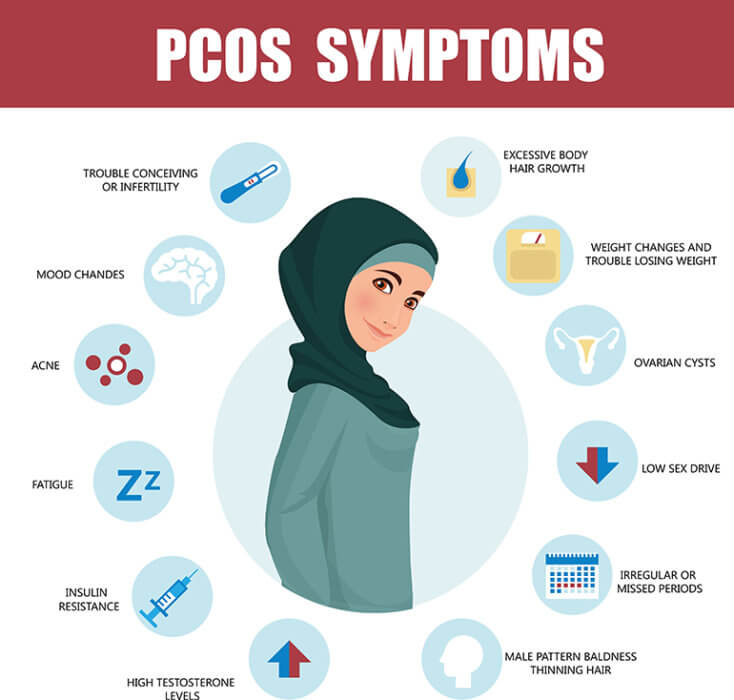Young Kashmir women have been falling prey to Polycystic Ovarian Disease (PCOD).
PCOS stands for polycystic ovary syndrome. It is characterized by infrequent or prolonged menstrual periods or excess male hormone (androgen) levels. The ovaries may develop numerous small collections of fluid (follicles) and fail to regularly release eggs.
A recent study titled, “Prevalence of polycystic ovary syndrome (PCOS) among reproductive-age women from Kashmir valley” was conducted at the Department of Endocrinology, SKIMS, and headed by Professor Ashraf Ganai.
It shows the “prevalence of PCOS is high among Kashmiri women and is probably the highest in a published series globally.”
The study published in the International Journal of Gynecology and Obstetrics in 2020 estimated the prevalence of polycystic ovary syndrome (PCOS) among women of reproductive age across educational institutions in Kashmir.
“Out of a total of 3300 eligible women, 964 women were evaluated in this study. Among these, 446 (46.4%) were identified as “probable PCOS” cases. Out of 171 probable PCOS women who completed all biochemical, hormonal, and sonographic assessments, 35.3% qualified for a diagnosis of PCOS,” it says.
Dietary Tips to keep PCOS at Bay
Your diet is paramount, and you should know exactly what, how much, and when to eat; and what to avoid. Below we present five dietary tips to help control weight gain if you suffer from PCOS.
Reduce and Choose Your Carbohydrate Intake Wisely
The amount and quality of carbs you consume affect your insulin directly. While monitoring carb intake is essential, be more practical rather than completely trying to cut out carbs from your diet.
Eat complex carbs. These are non-inflammatory as well as high in fiber. The fiber works towards nurturing the quality and quantity of gut bacteria that assist in weight loss. A few good sources of complex carbs include whole grains, millets, sweet potato, quinoa, and seasonal vegetables.
Eat ‘Good’ Fats
Monounsaturated and polyunsaturated fats improve cholesterol and help reduce inflammation. Since the sex hormones are made up of cholesterol, eating good fats help reset and stabilize these hormones which go haywire in PCOS.
Such higher quality fats also help in the absorption of fat-soluble vitamins, thus avoiding nutritional deficiencies and promoting overall health. Another big plus with good fats is that they help you feel satiated, and keep your food cravings in check. A few sources of such good fats include nuts, seeds, coconut, ghee, and avocado.
Increase Your Protein Intake
Protein promotes lean muscle mass. The more lean muscle mass your body has, the higher the metabolism. It also keeps blood sugar at a healthy level and makes you feel satiated. Thus eating enough protein daily can impact your weight-loss program positively by avoiding food cravings, and increasing your fat-burning capacity.
So plan all your meals in a way that includes a sufficient amount of protein. Some good sources are lentils, boiled egg whites, cottage cheese, fatty fish such as salmon and tuna, and chicken breasts.
Include Fermented Foods
Gut bacteria are very significant in metabolism and weight control. A ton of medical research states that an unhealthy gut microbiome can cause insulin resistance, hyperandrogenism, chronic inflammation, and metabolic syndrome (obesity, diabetes) and may contribute to the development of PCOS.
So it becomes important to include food sources that lead to a higher level of ‘healthy’ gut bacteria. Fermented foods and probiotics such as homemade curd, idli, dhokla, kimchi, kanji, and homemade pickles are a good choice. These foods help release good bacteria inside your gut.
Stay Well Hydrated
Drinking enough water throughout the day is important if you suffer from PCOS. That’s because a few of the disease’s side effects include frequent urination, dehydration, and fatigue. Dehydration can lead to bloating, cramps, headaches, and sluggishness.
Water is also crucial in the transportation of nutrients, and detoxification. Moreover, thirst may be mentally misunderstood as hunger, and one ends up consuming unhealthy calories.
So, drink enough water daily, and pay attention to the color of your urine. Healthy urine is pale yellow in color; excessively dark-colored urine indicates that you are dehydrated.
Summing Up
Bringing down excess weight resulting from PCOS is crucial at many levels. It would help ward off other life-threatening diseases such as diabetes and cardiac conditions. Staying hydrated and eating a well-balanced diet, which includes complex carbs, good fats, and lean sources of protein can help you with your weight management, and thus with PCOS.
Give lifestyle a chance, use the magic of food, exercise, and fixed routine as a therapy to deal with your issues naturally. This holistic and sustainable approach can help reverse PCOS naturally to a large extent.
(Hirra Azmat covers health at The Kashmir Monitor. Email: [email protected])











